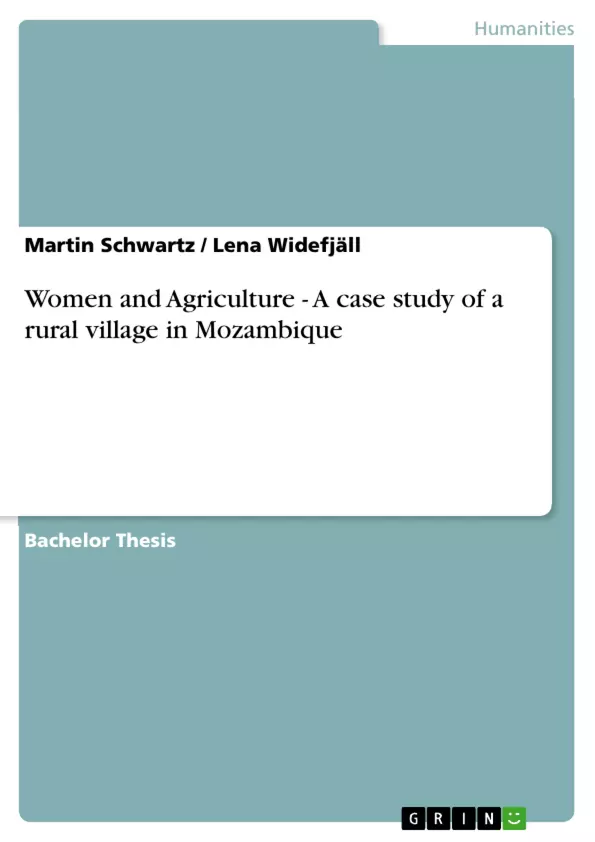This bachelor thesis is based on a field study performed in the rural village Maciene in Mozambique. The village is situated in the Gaza province, in the southern part of the country. Most of the people in the village are peasant farmers, but they also live from cattle breeding and small-scale fishing. The village is situated in the Lebombo diocese within the Anglican Church. The Swedish church diocese in Västerås and the Swedish Mission Council are since many years supporting a development project in the village that is called The Maciene Vision. Since 2002 has Mälardalen University been part of the project, and students at the programme Economy for sustainable development and the Public health programme have been given the opportunity to perform field studies in Maciene.
Inhaltsverzeichnis (Table of Contents)
- 1. Introduction
- 1.1 Background
- 1.2 Problem area and problem definition
- 1.3 Purpose
- 1.4 Delimitation
- 1.5 Target group
- 1.6 Definitions and abbreviations
- 1.7 Disposition
- 2. Scientific and theoretic approach
- 2.1 Hermeneutic
- 2.2 Ecological Economics and institutional theory
- 2.3 Feminist theory
- 3. Scientific method
- 3.1 Realisation
- 3.2.1 Literature review
- 3.2.2 Choice of respondents
- 3.2.3 Interview performance
- 3.2.4 Participation observation
- 3.2.5 Analyze method
- 3.2. Ethical considerations
- 3.3 Critical reflections on method and sources
- 4. Women's situation in Mozambique
- 4.1 An introduction to Mozambique
- 4.1.1 A developing country with a colonial history
- 4.2 Women's situation
- 4.2.1 The family situation of women
- 4.2.2 Division of labour between women and men
- 4.2.3 Women's access to economic resources
- 4.2.4 Women's access to land
- 4.3 Possibilities to develop women's situation
- 4.3.1 Women and micro-credits
- 4.1 An introduction to Mozambique
- 5. The rural village Maciene
- 5.1 An introduction to the village
- 5.1.1 The development work
- 5.1.2 Previous studies about women in Maciene
- 5.2 Local leaders' view on women's situation
- 5.2.1 Division of labour between women and men
- 5.2.2 Women's access to economic resources
- 5.2.3 Women's access to land
- 5.3 Local leaders view on possibilities
- 5.3.1 Women and micro-credits
- 5.1 An introduction to the village
- 6. The farmers in Maciene
- 6.1 Female and male farmer's view
Zielsetzung und Themenschwerpunkte (Objectives and Key Themes)
The purpose of this thesis is to examine the situation of female farmers in Maciene, Mozambique, focusing on the division of labor in agriculture and households, access to economic resources, and access to land. The thesis aims to identify possibilities for developing the situation of female farmers in these three areas and explore the potential impact of micro-credits.
- Division of labor between women and men in agriculture and households
- Female farmer's access to economic resources
- Female farmer's access to land
- The role of micro-credits in improving the situation of female farmers
- Social and cultural factors influencing the situation of women in rural Mozambique
Zusammenfassung der Kapitel (Chapter Summaries)
The thesis begins by providing a comprehensive introduction to the topic of women in agriculture, outlining the research problem, purpose, and methodology employed. It then delves into the scientific and theoretical framework underpinning the study, drawing on hermeneutics, ecological economics, institutional theory, and feminist theory. The chapter on the scientific method details the research process, including literature review, choice of respondents, interview performance, participation observation, analysis methods, and ethical considerations.
The following chapter provides context by discussing the broader situation of women in Mozambique, including their family situation, division of labor, access to economic resources, and access to land. The chapter also explores potential avenues for improving the situation of women in the country, such as micro-credit programs. Chapter 5 then focuses specifically on the rural village of Maciene, providing an overview of the village, its development work, and previous studies on women in the area. The chapter then presents the perspectives of local leaders on the division of labor, women's access to resources, and access to land.
Chapter 6 concludes the thesis by examining the views of farmers in Maciene, providing insights into the specific experiences and perspectives of both female and male farmers. This chapter explores the challenges and opportunities faced by female farmers in the village.
Schlüsselwörter (Keywords)
The primary keywords and focus topics of this thesis include women in agriculture, division of labor, access to economic resources, access to land, micro-credits, Mozambique, rural development, gender equality, and social and cultural factors.
Frequently Asked Questions
What is the situation of female farmers in Maciene, Mozambique?
Female farmers in Maciene are primarily peasant farmers who handle most of the agricultural work while also managing household duties, often with limited access to resources.
How is land access regulated for women in rural Mozambique?
Land access is often influenced by traditional patriarchal structures, making it more difficult for women to own or inherit land compared to men.
Can micro-credits improve the situation of women in agriculture?
Micro-credits are seen as a potential tool to empower women by providing capital for seeds, tools, or small business ventures, thus increasing their economic independence.
What is "The Maciene Vision" project?
It is a development project supported by the Swedish church and other organizations aimed at improving health, education, and sustainable development in the village.
How is the division of labor structured between genders in Maciene?
There is a clear division where women are responsible for both subsistence farming and domestic tasks, while men often focus on cattle breeding or seeking work outside the village.
- Arbeit zitieren
- Martin Schwartz (Autor:in), Lena Widefjäll (Autor:in), 2006, Women and Agriculture - A case study of a rural village in Mozambique, München, GRIN Verlag, https://www.grin.com/document/71218



